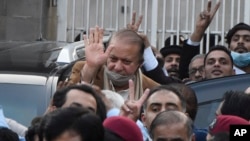A Pakistani federal court on Tuesday quashed the conviction of former Prime Minister Nawaz Sharif in a final corruption case, which brings him closer to running for national elections in February.
Sharif has served as Pakistan’s prime minister for three nonconsecutive terms.
Sharif returned to Pakistan in October after a four-year self-imposed exile in London to avoid serving a 10-year prison sentence for corruption charges.
His party, the Pakistan Muslim League-N, or PML-N, says the 73-year-old politician plans to run for prime minister again for the fourth time.
The high court in the capital, Islamabad, announced its verdict on Tuesday in response to Sharif's appeal, which he filed against his conviction shortly after returning to Pakistan.
The acquittal came nearly two weeks after the court overturned his conviction in another graft case.
Sharif’s party welcomed Tuesday’s court ruling, claiming he stands “acquitted in all lawsuits today” and dismissing “fake” corruption charges against him.
“God willing, Nawaz Sharif will become the Prime Minister for the fourth time with the people's vote,” Marriyum Aurangzeb, a PML-N spokesperson, said on X, formerly known as Twitter.
Sharif is expected to be a top contender in elections scheduled for February 8, 2024, if his legal challenges are removed. However, legal experts noted that quashing the two corruption convictions does not mean the stage is set for Sharif’s political comeback.
He stepped down from the prime minister's office in 2017 after Pakistan’s Supreme Court found him guilty of lying about his assets during a corruption probe and disqualified him from holding any public office. The deposed leader was subsequently convicted and sentenced to seven years and 10 years concurrently in prison by an anti-graft court in 2018 in the now-quashed graft charges against him.
Sharif has never completed a full term in office, as all his governments were dismissed or faced allegations of corruption and misrule. He has denied wrongdoing and maintained the charges brought against him have been politically motivated, blaming the Pakistani military for orchestrating them after he fell out with the powerful institution.
He claims that after staging his 2017 ouster from power, the military supported his political rival, former Prime Minister Imran Khan, in the 2018 elections.
Khan also fell out with the military and is currently serving a three-year sentence on corruption charges, which he alleges are the work of the military to prevent him from returning to power.
The 71-year-old cricket star-turned-former prime minister remains the most popular politician in Pakistan, with his Pakistan Tehreek-e-Insaf Party the biggest political force, according to the latest opinion polls.
Pakistani politicians and independent critics have increasingly accused army generals of plotting the removal of elected governments that don’t fall in line with the military, particularly when it comes to making foreign and security policies or questioning the military’s commercial interests.
While the army has consistently denied any interference with national politics, its former chief, retired General Qamar Javed Bajwa, admitted publicly just before stepping down last year that his institution had meddled in civilian affairs for decades, exposing it to severe public criticism.
“I believe the major reason for this is the constant meddling by the army in politics for the last 70 years, which is unconstitutional,” Bajwa said in a televised speech to military officers and deceased soldiers’ relatives in November 2022.
“That is why since February last year, the military has decided they will not interfere in any political matter,” he added, though critics quickly dismissed Bajwa’s statement as mere claims.
The military has staged three coups and ruled Pakistan for more than three decades since the country gained independence from Britain in 1947.




